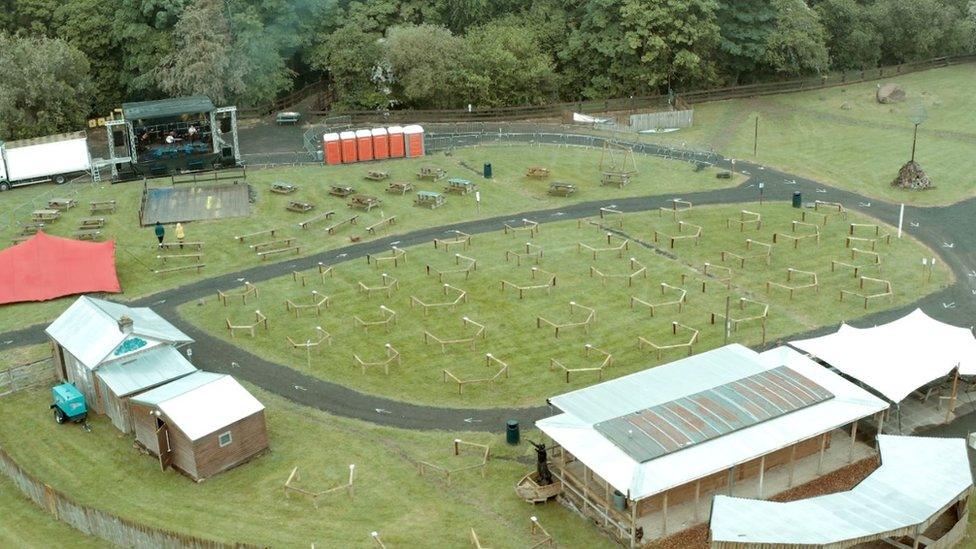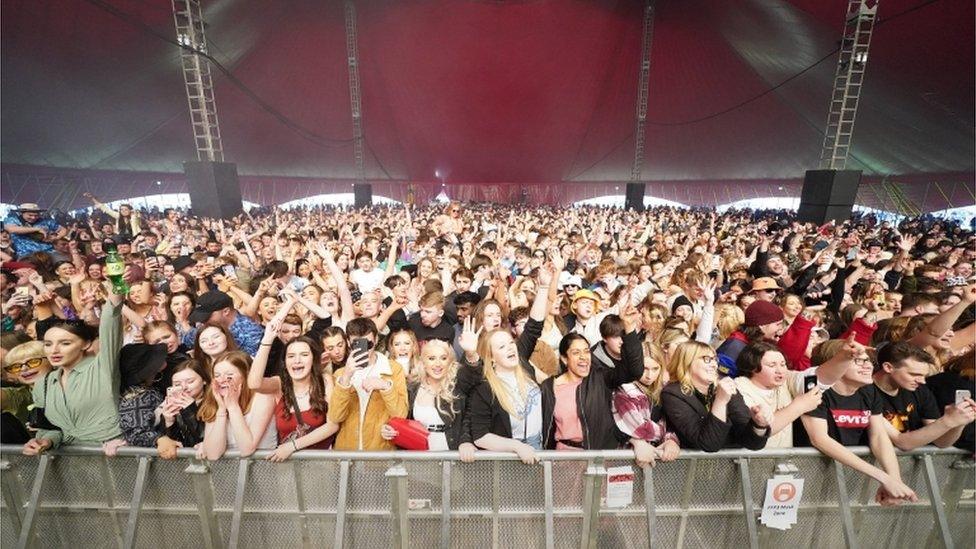Covid-19: Great hopes and worries for summer of live music
- Published

The Belsonic festival previously hosted thousands of people at Ormeau Park in Belfast
For anyone hoping to see live music in Northern Ireland this summer, a quick scan online would throw up plenty of options.
However, with the industry in the early stages of reopening, and uncertainty about Covid-19 variants - things are still unsure.
On Thursday, the Northern Ireland Executive announced the relaxation of rules around live music would be delayed to 5 July.
The changes have been delayed due to concerns about an increase in case numbers of the Delta variant.
An announcement allowing the broader return of live music had been expected to come from the meeting, with an indicative date of 21 June.
For Joe Dougan, a promoter with Shine, he said the decision was "a shame" but he could "understand the rationale". "I was disappointed for all the musicians who were ready to go, who would have thought they were going to get out, now they can't.
"I do think in general there is a fundamental misunderstanding how risky or otherwise these events are."
He said getting clarity about how many people can attend events is crucial.
"We can't work within any social distancing constraints, and that's not just ourselves, that's anyone running events of this capacity," he said.
"However, we're fully prepared to explore any practicable solutions, like using a negative lateral flow test result as a condition of entry."
Shine outdoor events start with attendances of about 5,000 and go up to about 15,000.
It runs a number of venues in Northern Ireland, including the Limelight, the Telegraph Building, and the Ulster Hall, and also hosts the annual Belsonic music events in Ormeau Park, and concerts in Custom House Square.

Nile Rodgers played at Belsonic in 2018, and is set to play Custom House Square in August
Currently restrictions from the Executive limit outdoor gatherings to 500 people.
Mr Dougan said it "doesn't make any sort of sense" to hold an outdoor music event with 500 attendees.
"For live music events to break even, we need to be operating at about 80% of occupancy; at 50% of ticket sales you are automatically losing money," said Mr Dougan.
Despite the concerns, he is optimistic the summer of events will be going ahead starting with a run of concerts in the Ulster Hall in July, with a number of major acts including Nile Rodgers and Kodaline booked for Custom House Square in September.
"I feel like there is a positive outlook, that there is going to be the return from all of the restrictions," he said.
'They recognise the arts industry'
For events companies and promoters in Northern Ireland, the picture may seem rosier south of the border.
This week, the Irish government announced the recipients of €25 million (£21.5 million) given out to support concerts and festivals, external, which will benefit 230 organisations.
One of the recipients is The Academy, a Shine venue in Dublin.
"[The Live Performance Support Scheme] is very helpful, it is most helpful in terms of bringing staff back to work," said Mr Dougan, adding it would be staff and musicians who would be the primary beneficiaries.
Kieran Gilmore, director of Open House Festival, said he felt Thursday's announcement was "another slap in the face".
His organisation had been planning a free music event in Ward Park, Bangor, in early July, which will now be cancelled.
"I can't see outdoor well-managed socially-distanced, fully-seated shows posing a threat. It is a blanket approach, I don't think this decision has been thought out very well."
Mr Gilmore said he thought the money being made available in the Republic was "fantastic".
"I note that most of the recipients operate within the commercial sector, they are commercial promoters," he said.
"It is great that the government has recognised that it's an industry, like every other industry that is being supported.
"You can see the Irish government understand and value the arts industry, whereas up here they just think it's entertainment and nothing else."
Mr Gilmore noted that a draft budget produced by the Northern Ireland Arts Council, external in February showed the organisation's funding was £5.38 per capita, in comparison to £28.52 in the Republic of Ireland.
A Department for Communities spokesman said £36m in funding had been given to the culture, languages, arts and heritage sectors since April 2020, and noted the Culture Recovery Taskforce had been established.
"The most sustainable way to support the people, organisations, activities and events that make up our arts sector is to put in place the measures that allow it to re-open safely and them to return to what they do so well," the department said.

Open House festival director Kieran Gilmore wants dates to be set for the return of live music events in Northern Ireland

Mr Gilmore said while he welcomed the Culture Recovery Taskforce, it was disappointing it had not been established sooner.
The taskforce is made up of people from across the sector, including those who run festivals, music, theatre and arts venues and organisations.
Indoor entertainment has been reopened in England, Scotland and Wales since last month.
'You can jump in a swimming pool'
Stendhal Festival has already taken its first baby steps towards the return of concerts.
Earlier this month it welcomed 250 invited guests to Ballymully Cottage Farm in Limavady, County Londonderry, for one of Northern Ireland's first outdoor music events in more than a year.
Ross Parkhill, festival director and founder, said Thursday's announcement was "pretty horrendous".
"Everything else is open up, you can jump in a swimming pool with hundreds of people you don't know in that same swimming pool. Very frustrating and disappointing," he said.
Mr Parkhill said his festival had a "role in promoting confidence, as a general concept to the wider public".
"People need to build their confidence back to go to these events. Nobody has been with more than 30 people for God knows how long."

Special measures were taken to ensure social distancing at Stendhal Festival's outdoor event earlier this month
He said the fact the venue is based on a farm put them in the "very fortunate" position of being able to hold a small scale event - but that profitability in the future would depend on attraxting larger numbers.
Events would become financially viable if about 2,500 people were able to attend, he said.
"I have to commend down south, having that fund launched last November, that has definitely given the sector a blast of hope - to have something oven ready," said Mr Parkhill.
He said while he hoped something similar could be done in Northern Ireland, the sector would have benefitted from it already being in place.
"Everybody needs an escape to a farm for a weekend, and we could have been sitting ready," he said.
"When we've had 16 months to prepare, it's just really poor to be honest."
Related topics
- Published17 June 2021

- Published8 May 2021

- Published18 May 2021
